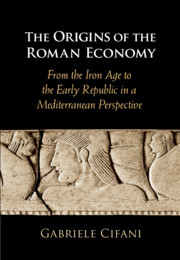 The Origins of the Roman Economy
The Origins of the Roman Economy Book contents
- The Origins of the Roman Economy
- The Origins of the Roman Economy
- Copyright page
- Dedication
- Epigraph
- Contents
- Figures
- Tables
- Acknowledgements
- One Introduction
- Two Notes on the Geographical Context of Early Rome
- Three The Beginnings of a Longue Durée
- Four The Early Iron Age (Latial Phases II and III)
- Five A Settlement Unlike Others
- Six Latial Phase IV (730–580 BC)
- Seven Latial Phase IVA (730–640 BC)
- Eight Latial Phase IVB (640–580 BC)
- Nine The Archaic Phase (580–500 BC)
- Ten Modelling Demography and Consumption
- Eleven Places and Institutions in the Archaic Roman Economy
- Twelve The Economics of the Early Calendar
- Thirteen The Early Latins Overseas
- Fourteen The Fifth Century BC
- Fifteen Crisis and Opportunities in the Fifth Century BC
- Sixteen The Fourth Century BC
- Seventeen Fourth-Century Transformations and the End of the Archaic Economy
- Eighteen Epilogue
- Book part
- Notes
- Bibliography
- Index
Five - A Settlement Unlike Others
The Economic and Cultural Background to the Rise of Rome
Published online by Cambridge University Press: 18 February 2021
- The Origins of the Roman Economy
- The Origins of the Roman Economy
- Copyright page
- Dedication
- Epigraph
- Contents
- Figures
- Tables
- Acknowledgements
- One Introduction
- Two Notes on the Geographical Context of Early Rome
- Three The Beginnings of a Longue Durée
- Four The Early Iron Age (Latial Phases II and III)
- Five A Settlement Unlike Others
- Six Latial Phase IV (730–580 BC)
- Seven Latial Phase IVA (730–640 BC)
- Eight Latial Phase IVB (640–580 BC)
- Nine The Archaic Phase (580–500 BC)
- Ten Modelling Demography and Consumption
- Eleven Places and Institutions in the Archaic Roman Economy
- Twelve The Economics of the Early Calendar
- Thirteen The Early Latins Overseas
- Fourteen The Fifth Century BC
- Fifteen Crisis and Opportunities in the Fifth Century BC
- Sixteen The Fourth Century BC
- Seventeen Fourth-Century Transformations and the End of the Archaic Economy
- Eighteen Epilogue
- Book part
- Notes
- Bibliography
- Index
Summary
The transition from the Final Bronze Age to the Early Iron Age was accompanied by many social and economic phenomena and was linked to an increasingly complex social evolution which is usually defined as the transformation of villages into cities in human geographical terms, and of chiefdoms or tribal states into early states in socio-archaeological models.
- Type
- Chapter
- Information
- The Origins of the Roman EconomyFrom the Iron Age to the Early Republic in a Mediterranean Perspective, pp. 50 - 57Publisher: Cambridge University PressPrint publication year: 2020


